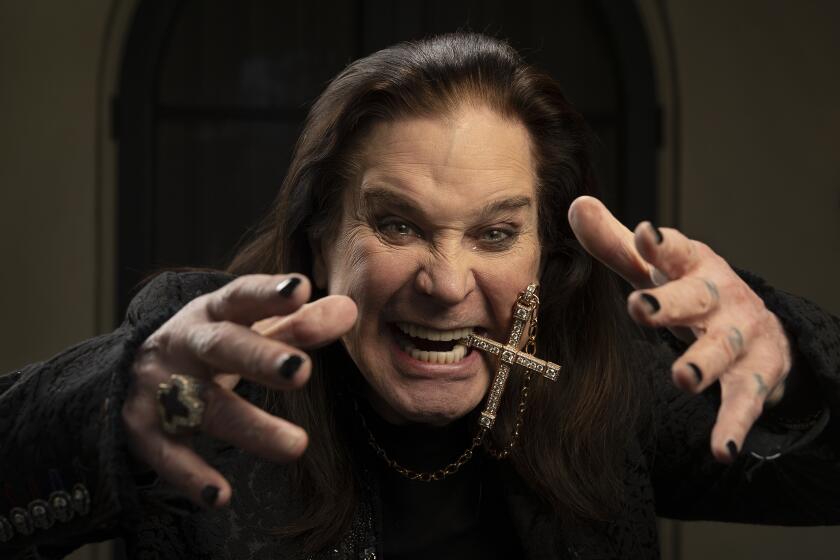‘Hamlet’ by L.A. Repertory; ‘Robeson’ at Ensemble Studio Theatre; ‘Offenbach’ at Magnolia
- Share via
How many ways can “Hamlet” be done? The L.A. Repertory Company recently did it with six actors. I once saw a “Hamlet” in London without the ghost; instead, the Prince was possessed by his father’s spirit. It worked, but “Hamlet,” because of its internal mysteries and theatrics, and its blurring of madness and sanity, is vulnerable to sometimes thoughtless directorial tinkering.
Director Mark Ringer has decided to do something different at Theatre Exchange: “Hamlet” straight and with minor cuts. That means a three-hour playing time, a long graveyard scene and a marathon for Jon Mullich as the Prince. No one is worse for the wear, and Mullich gets a vital second wind, emboldening his Hamlet with touches of gallows humor and mocking fatalism.
The production needs a more careful eye, however. The uncredited music is your worst nightmare of ersatz synthesized royalty alarums. Adam Lindsey’s fake-looking set of decaying stone walls and frayed rope actually lessens the moods many in the cast strive for.
Some of the players, such as Don Schlossman’s Claudius, Eddie Fierson’s Horatio and John Perry’s Laertes, strive for no mood at all. Deborah Gates, by contrast, works too hard at showing Ophelia’s madness--a common error with a difficult role. They look all the weaker next to the comic powers of Bill Kerr’s Polonius or Steve Ruggles’ Osric, the range of Cherie Brown’s Gertrude, or the emotive power of Steve Peterson’s Ghost. Ringer conceived this with earnestness; now he needs to fine-tune.
At 11855 Hart St., North Hollywood, Thursdays through Saturdays, 8 p.m., Sundays, 2 p.m., until Dec. 4. Tickets: $12.50; (213) 465-0070.
‘Paul Robeson’
The only real change in Philip Hayes Dean’s one-man play, “Paul Robeson,” since its appearance at the Odyssey Theatre five years ago is Ronald E. Bishop as the piano accompanist. A minor change is the Ensemble Studio Theatre space, much larger than the Odyssey’s. Neither factor is a boost to a work that has become tired and worn with time.
To be sure, with time’s passage, one would have hoped that director Howard Kalmenson and actor Bennet Guillory might have examined and sharpened the softness in Dean’s generous biographical sketch. Robeson the actor, singer and activist displayed epic-sized emotions and ideas (think of his “Othello,” or his view of the Spanish Civil War as Hitler’s testing ground), and Dean suggests the man’s richness.
But it remains a suggestion only. Dramatics are blunted in several ways. The one-man format’s problems are never worked out, as in his encounters with Soviet guards or Nazi and British agents (Robeson toured where angels fear to tread). The less-than-stentorian Guillory always reacts to a racist slur the same way: With a cool demeanor that builds to a small boil.
It’s fine that pianist Bishop injects a spirited melodic undercurrent. It’s not fine during Robeson’s moments of tragedy. Any actor alone on stage needs support, not interference.
At 1089 N. Oxford Ave., Wednesdays through Saturdays, 8 p.m., until Dec. 11. Tickets: $15; (213) 466-2916.
‘Offenbach’
Composer Jacques Offenbach, history tells us, had a difficult time re-staging his once-scandalous “Orpheus in the Underworld” in 1874. He may have been low on money, even possibly low on strong performers. But Offenbach at his most desperate would never have put up with what’s on view in Harvey Sacks’ production of “Offenbach in the Underworld” at the Magnolia Playhouse.
Is this a situation where an untalented theater group with few resources is trying to cover its limitations by doing a comedy about an earlier, impoverished production? That’s the suspicion from the start, when an uncoordinated quartet of dancers do the cancan, and then Offenbach’s brother (Brian Dodd) comes on to chide them. The dancers never improve the rest of the way, yet, in the end, are roundly applauded by the artists.
The play, by Sacks, Frederick Grab and Richard Niederberg, trashes Offenbach’s peculiar way with satire with the triple threat of bad makeup, unlistenable dialogue and inappropriately young actors. The climax, when a committee including Wagner, Nietzsche and Strauss judge “Orpheus” suitable for the public, gives new meaning to the phrase Theater of the Absurd.
At 11246 Magnolia Blvd., North Hollywood, on Thursdays and Sun days, 8:30 p.m., indefinitely. Tickets: $12; (818) 769-9000.
More to Read
The biggest entertainment stories
Get our big stories about Hollywood, film, television, music, arts, culture and more right in your inbox as soon as they publish.
You may occasionally receive promotional content from the Los Angeles Times.










